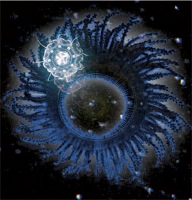Difference between revisions of "Perpetual"
(Created page with 'File:lighterstill.jpgright|frame ==Origin== [http://nordan.daynal.org/wiki/index.php?title=English#ca._1100-1500_.09THE_MIDDLE_ENGLISH_PERIOD Midd...') |
m (Text replacement - "http://" to "https://") |
||
| (One intermediate revision by the same user not shown) | |||
| Line 2: | Line 2: | ||
==Origin== | ==Origin== | ||
| − | [ | + | [https://nordan.daynal.org/wiki/index.php?title=English#ca._1100-1500_.09THE_MIDDLE_ENGLISH_PERIOD Middle English] perpetuel, from Anglo-French, from [[Latin]] perpetuus uninterrupted, from per- through + petere to go to |
| − | *[ | + | *[https://en.wikipedia.org/wiki/14th_century 14th Century] |
==Definitions== | ==Definitions== | ||
*1a : continuing forever : everlasting <perpetual motion> | *1a : continuing forever : everlasting <perpetual motion> | ||
| Line 12: | Line 12: | ||
'''Perpetual motion''' describes [[hypothetical]] [[machines]] that operate or produce useful [[work]] indefinitely and, more generally, hypothetical [[machines]] that produce more [[work]] or [[energy]] than they consume, whether they might operate indefinitely or not. | '''Perpetual motion''' describes [[hypothetical]] [[machines]] that operate or produce useful [[work]] indefinitely and, more generally, hypothetical [[machines]] that produce more [[work]] or [[energy]] than they consume, whether they might operate indefinitely or not. | ||
| − | There is undisputed [ | + | There is undisputed [https://en.wikipedia.org/wiki/Scientific_consensus scientific consensus] that perpetual motion would [[violate]] either the [https://en.wikipedia.org/wiki/First_law_of_thermodynamics first law of thermodynamics], the [https://en.wikipedia.org/wiki/Second_law_of_thermodynamics second law of thermodynamics], or both. Machines which comply with both laws of thermodynamics but [[access]] [[energy]] from obscure [[sources]] are sometimes referred to as perpetual motion machines, although they do not meet the [[standard]] criteria for the name. |
| − | Despite the [[fact]] that successful perpetual motion devices are [[physically]] impossible in terms of our current [[understanding]] of the [[laws]] of [[physics]], the pursuit of perpetual motion remains [[popular]].[ | + | Despite the [[fact]] that successful perpetual motion devices are [[physically]] impossible in terms of our current [[understanding]] of the [[laws]] of [[physics]], the pursuit of perpetual motion remains [[popular]].[https://en.wikipedia.org/wiki/Perpetual_motion] |
[[Category: Physics]] | [[Category: Physics]] | ||
Latest revision as of 02:37, 13 December 2020
Origin
Middle English perpetuel, from Anglo-French, from Latin perpetuus uninterrupted, from per- through + petere to go to
Definitions
- 1a : continuing forever : everlasting <perpetual motion>
- b (1) : valid for all time <a perpetual right> (2) : holding (as an office) for life or for an unlimited time
- 2: occurring continually : indefinitely long-continued <perpetual problems>
- 3: blooming continuously throughout the season
Description
Perpetual motion describes hypothetical machines that operate or produce useful work indefinitely and, more generally, hypothetical machines that produce more work or energy than they consume, whether they might operate indefinitely or not.
There is undisputed scientific consensus that perpetual motion would violate either the first law of thermodynamics, the second law of thermodynamics, or both. Machines which comply with both laws of thermodynamics but access energy from obscure sources are sometimes referred to as perpetual motion machines, although they do not meet the standard criteria for the name.
Despite the fact that successful perpetual motion devices are physically impossible in terms of our current understanding of the laws of physics, the pursuit of perpetual motion remains popular.[1]
